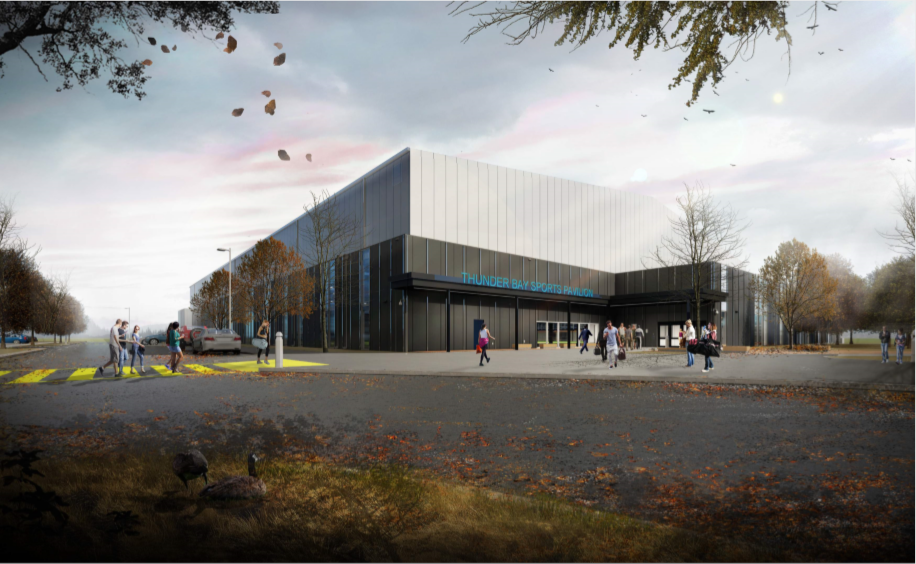THUNDER BAY – A controversial indoor sports complex looks set to move ahead after Thunder Bay’s city council voted to put the project to tender following hours of debate Monday night.
The decision still needs to be ratified by council at its next meeting on Aug. 24, though its passage on a 9-4 vote would seem to make a reversal unlikely.
The Chapples Park facility would offer opportunities for sports including soccer, ultimate frisbee, cricket, football, lacrosse, and baseball training, with a full size indoor field that can be divided in four for smaller games and practice.
The project comes with a price tag of $33.6 million – though a recent review by the city’s Community Economic Development Commission (CEDC) suggested actual costs to the city could exceed $48 million.
A group of four councillors – Mark Bentz, Trevor Giertuga, Brian Hamilton, and Rebecca Johnson – argued council should delay a decision on the project given the uncertain financial impact of COVID-19 and lack of hoped-for support from upper levels of government.
That echoed a recommendation to wait from city manager Norm Gale and the results of city consultations, which showed a majority of respondents opposed moving forward with the project at this time.
Of the 405 respondents to a survey on the project in July and August, 23 per cent opposed it outright, while another 27 per cent felt now was not the right time to go ahead with it. That compared to 35 per cent who clearly supported it.
Proponents, however, argued Monday the cost of the project was worth bearing given its benefits. It would meet the desperate need for indoor recreation opportunities in the city – especially for youth - and help make Thunder Bay a more attractive place for young people, they said.
“It’s going to continue bringing people into our city and keep people from leaving it,” Soccer Northwest president Mike Veneziale told councillors. “When young professionals are looking to move to a city, this is something they’d look towards.”
The head of the group, which has long advocated for a permanent indoor facility, said the venue still wouldn’t meet demand for field time during the winter, and was likely to turn a profit after its second year in operation.
Coun. Andrew Foulds framed the turf facility as a legacy project with the power to help define the city and the opportunities it offers, comparing it to the community auditorium. The uncertainty of the COVID-19 crisis made approving it the most difficult decision in his 14 years on city council, he said – but ultimately felt its positive impact would justify the expense.
Just how much the facility is likely to cost the city remains up for debate. So far unsuccessful in securing support from the provincial or federal governments, the municipality now could bear its full cost.
That was a deal-breaker for councillors like Giertuga and Johnson, given a projected $7 million deficit for the city in 2020 thanks to the pandemic.
“I think we need an endorsement from the community, and right now they’re saying no,” said Johnson.
Neebing ward councillor Cody Fraser acknowledged the project may be unpopular with many constituents and said voting for it could hurt him electorally, but felt strongly it was the right thing for the community’s future.
He had yet to speak to someone under age 35 who opposed it, he said.
“To be frank, I’m upset that the conversation’s all about money,” he said. “I think this facility is a glimmer of hope, a glimmer of some kind of normalcy, whatever that’s going to look like.”
The project will no longer be eligible for nearly $22 million in federal infrastructure dollars the city had applied for once the tender contract is awarded. Applications for around $1 million through NOHFC and FedNor are still outstanding, while the city says it will continue to seek other sources.
The facility itself is estimated to cost $33.6 million, but with interest payments expected on a possible $15 million debenture needed to pay for the project over 25 years, the cost rises to $42 million.
The debenture would supplement around $15 million already saved in an Indoor Turf Facility Reserve Fund, $3.3 million from the Renew Thunder Bay Reserve Fund, and around $500,000 from 2020 Municipal Accommodation Tax dollars.
The Thunder Bay Community Economic Development Corporation (CEDC) called the city’s cost estimates into question in a recent review of the project, saying it could in fact wind up costing $48 million or more including interest on the debenture, partly due to the impact of COVID-19 on construction costs.
A last-minute intervention from the Canadian Lakehead Exhibition (CLE), asking the city to consider its intercity location for the indoor sports complex, went unheeded despite promises the move would save the city money on site preparation and attract more visitors thanks to its central location.
City administration expected the project would take 24 to 26 months to complete after going to tender.
